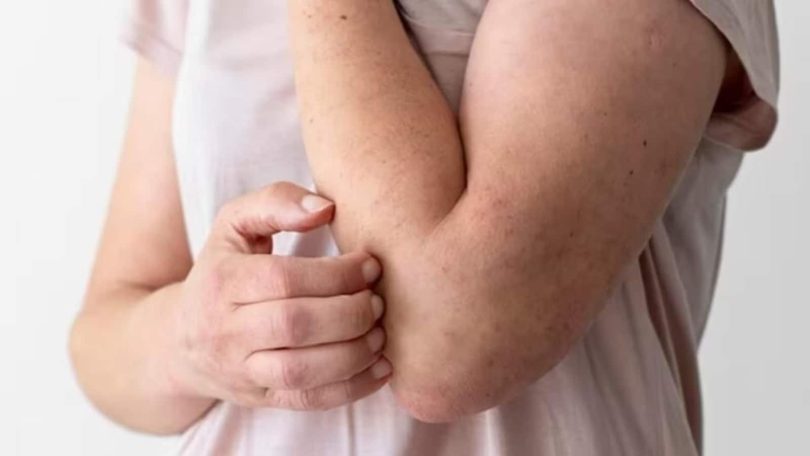[ad_1]
Alongside dengue and flu cases, Hyderabad has now been burdened with an increase in scrub typhus cases which is typically seen in rural areas but is now also present in urban areas, putting immunocompromised individuals, children, and the elderly at risk, as per the city doctors. Scrub typhus, also known as bush typhus, is a disease caused by a bacteria called Orientia tsutsugamushi where the bacterium Orientia tsutsugamushi is transmitted through the bites of infected larval mites, which can also infest rodents and these mites are commonly referred to as chiggers.

Causes:
In an interview with HT Lifestyle, Dr Yojana Pokarna, MD Ayurveda and Founder Of Orijine Clinic, revealed, “Scrub typhus is a disease caused by tiny bugs called mites. These mites carry a germ called Orientia tsutsugamushi. When they bite humans, they can pass on this germ.”
Symptoms:
According to Dr Nidhi Kamat, Consultant General Physician, General Infectious Diseases at Ramakrishna Hospital in Bengaluru’s Jayanagar, “This illness can manifest with severe symptoms, including high fever, chills, throbbing headaches, body aches and the formation of a distinct scab-like lesion at the location called as ‘eschar’ where the chigger has bitten. Additional indicators may encompass swollen lymph nodes, the appearance of a rash, and alterations in mental state such as confusion, or in severe cases, even slipping into a coma. In the most critical instances, scrub typhus can lead to organ failure and bleeding, potentially resulting in a fatal outcome if swift treatment is not administered.”
Dr Subrata Das, Senior Consultant – Internal Medicine and Diabetology at Sakra World Hospital in Bengaluru, also cautioned, “Serious signs of this condition may include fever, rashes in the palm and shoulders, vomiting, loose motion, chills, headache, body aches and the development of a distinctive lesion that resembles a scab at the location of the chigger bite. Swollen lymph nodes, a rash and mental modifications like confusion or even coma can also happen which is called encephalitis. Scrub typhus can cause organ failure and hemorrhage in extreme cases, which, if untreated, can be fatal.”
Treatment and prevention tips:
Dr Kritu Bandhari, MD in Dermatology and Cosmetology, pointed out that most cases of scrub typhus occur in rural areas of Southeast Asia, Indonesia, China, Japan, India and northern Australia hence, anyone living in or travelling to areas where scrub typhus is found could get infected. She suggested, “Scrub typhus should be treated with the antibiotic doxycycline. Doxycycline can be used in persons of any age. Antibiotics are most effective if given soon after symptoms begin. People who are treated early with doxycycline usually recover quickly. No vaccine is available to prevent scrub typhus. Reduce your risk of getting scrub typhus by avoiding contact with infected chiggers. When travelling to areas where scrub typhus is common, avoid areas with lots of vegetation and brush where chiggers may be found.”
Asserting that to get better, you need to see a doctor as soon as possible, Dr Yojana Pokarna opined that they will usually give you antibiotics, like doxycycline or azithromycin but in bad cases, you may need to go to the hospital and get extra care. She recommended the following tips on how to avoid scrub typhus:
1. Don’t let mites bite you. Wear long clothes, use bug spray, and avoid sitting on the ground in mite-prone areas.
2. Keep your surroundings clean to reduce mite homes.
3. Get rid of rodents (like rats), as they can attract mites.
4. Learn about scrub typhus if you live in an area where it’s common.
5. If you feel sick with scrub typhus symptoms, see a doctor quickly.
Dr Nidhi Kamat added, “To prevent scrub typhus: avoid bushy areas, wear full-body protection, and use DEET insect repellent. In places where scrub typhus is common, if you have symptoms similar to this disease, see a doctor right away. Tell them where you’ve travelled recently. They might do blood tests and begin specific antibiotic treatment without waiting for test results. Antibiotic works for all ages and can help you recover faster. Quick antibiotic treatment is essential for a successful recovery.”
Dr Subrata Das concluded, “Avoid locations with thick grass and wear long clothing while using DEET insect repellent. If you exhibit symptoms that appear to be scrub typhus, don’t hesitate; to seek immediate medical assistance. Your physician will probably recommend antibiotics such as Doxycycline, which is effective across all age groups and can expedite recovery. Your healthcare practitioner may also conduct blood tests, including either the newer IFA test or the conventional Weil Felix test.”
Awareness of the causes, symptoms and prevention measures of scrub typhus is crucial in regions where the disease is endemic to minimise its impact on public health. Early diagnosis and appropriate antibiotic treatment are key to managing the infection effectively.
 Subscribe today by clicking the link and stay updated with the latest financial insights! Click here!
Subscribe today by clicking the link and stay updated with the latest financial insights! Click here!

[ad_2]
Source link








